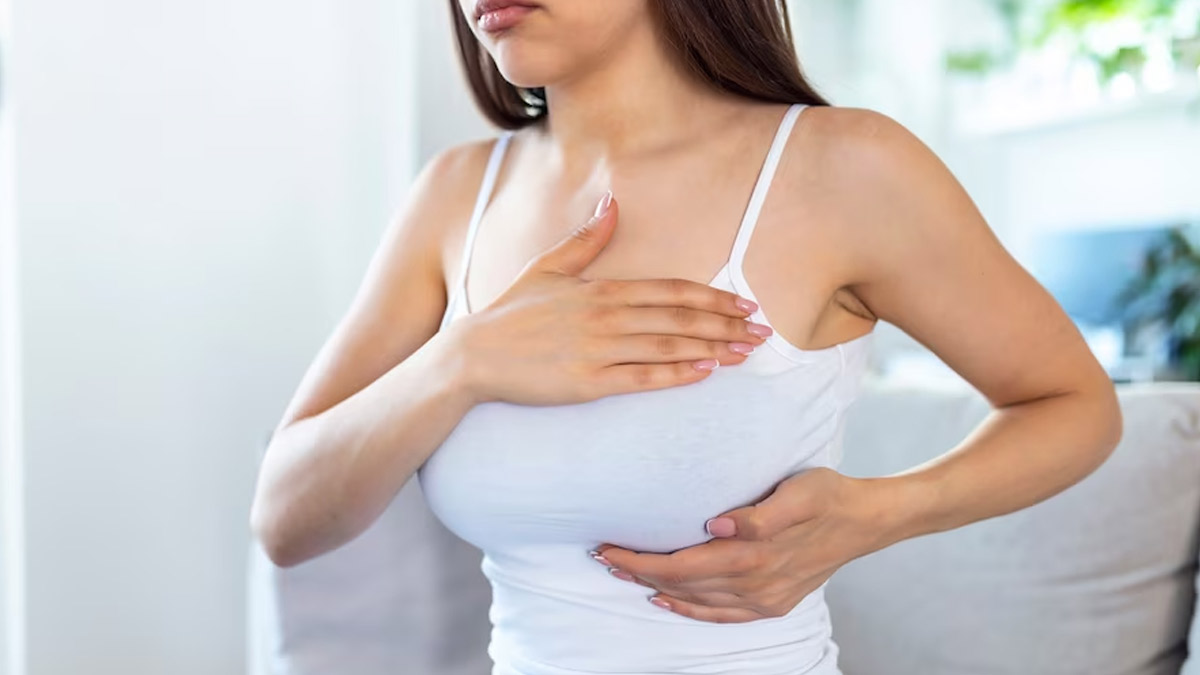
A female body undergoes various changes due to different reproductive milestones. In particular, menstruation is a key moment in a woman's reproductive cycle, which is a monthly process regulated by hormonal changes. Not only during menstruation, but women also experience symptoms before the start of the period. This is also called Premenstrual Syndrome (PMS). One of the most common symptoms is breast changes, which include pain, discomfort, and swelling. Speaking with the OnlyMyHealth team, Dr N Sapna Lulla, Lead Consultant-Obstetrics and Gynaecology, Aster CMI Hospital, Bengaluru, shed light on why it occurs and ways to differentiate it from other malignant breast conditions.
Table of Content:-
Also Read: Menstrual Health: Expert Decodes 5 Menstrual Disorders
What Is Premenstrual Syndrome (PMS) And Do They Worsen With Age?

PMS refers to a group of physical and emotional symptoms experienced in the days or weeks leading up to their menstrual period.
It is one of the most common menstrual disorders experienced by many young women worldwide, according to a study published in Clinical Epidemiology and Global Health. The study also reported that 75% of menstruating individuals experience symptoms of PMS, and 3–8% suffer from severe symptoms.
Some of the common symptoms of PMS include:
- Mood swings
- Irritability
- Bloating
- Breast tenderness
- Fatigue
- Headache
- Changes in appetite or sleep patterns
- Heightened sensitivity to stress
Interestingly, PMS symptoms can vary with age, said Dr Lulla.
“While some women may experience reduced symptoms over time, others may find that symptoms persist or worsen with age,” she added.
Further explaining the cause of PMS, she shared, “Hormonal fluctuations during the menstrual cycle remain the primary cause of PMS. As women age, hormonal patterns may change due to factors like perimenopause or lifestyle adjustments. Additionally, underlying health conditions or stressors can influence symptom severity."
Breast Changes Before Period

According to Dr Lulla, hormonal fluctuations, specifically changes in oestrogen and progesterone levels, trigger breast changes before menstruation.
She said, “Elevated progesterone leads to increased breast glandular tissue, causing swelling and tenderness,” adding that oestrogen induces water retention, further contributing to breast enlargement and discomfort.
“These cyclic hormonal shifts, occurring in the menstrual cycle's luteal phase, result in premenstrual breast changes commonly characterised by sensitivity, fullness, and occasionally mild pain,” the doctor further explained.
Also Read: Breast Cancer Vs. Breast Cysts: How To Distinguish Between The Lumps?
How To Differentiate It From Breast Cancer-Related Changes

Besides PMS, breast changes can also occur due to other benign and malignant conditions, like breast cysts and breast cancer, respectively. Therefore, it is important to differentiate between the various causes of breast changes to get timely treatment for the conditions that actually require it.
Dr Lulla said, “Distinguishing between premenstrual breast changes and those related to breast cancer involves monitoring patterns.”
She added, “Menstrual cycle-related alterations typically occur cyclically, presenting as temporary tenderness and swelling. In contrast, cancer-related changes may persist, manifesting as persistent lumps, skin changes, or nipple discharge.”
Furthermore, regular breast self-exams and professional screenings aid in early detection, the doctor advised.
Conclusion
Pre-menstrual breast changes, which include tenderness and swelling, are common and harmless. These are a normal physiological response to hormonal fluctuations, primarily driven by oestrogen and progesterone levels. But in case you experience other symptoms, such as hard lumps, nipple discharge, and skin changes, it is best to consult a healthcare professional. Persistent or severe discomfort should not be ignored.
Also watch this video
Read Next
Calcium Deficiency In Lactating Mothers: Expert Lists Symptoms, Prevention, And Management Tips
How we keep this article up to date:
We work with experts and keep a close eye on the latest in health and wellness. Whenever there is a new research or helpful information, we update our articles with accurate and useful advice.
Current Version